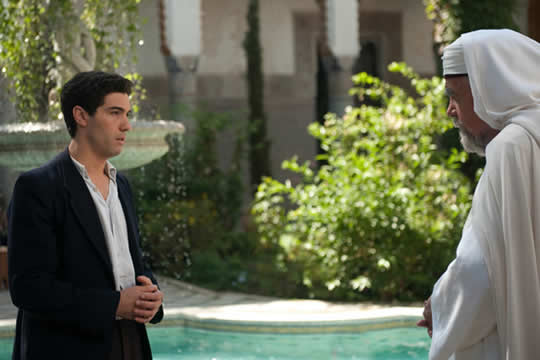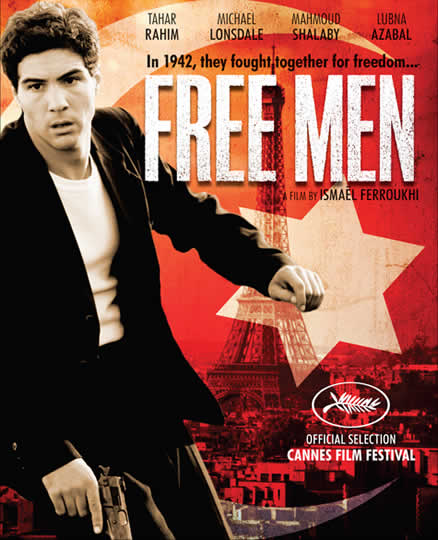 Ismail Ferroukhi’s “Free Men” (Les Hommes Libres) tells the true story of a cell of Algerian resistance fighters (secretly based in the Grand Mosque of Paris) who helped Jews escape the roundups of the Vichy government and the Gestapo.
Ismail Ferroukhi’s “Free Men” (Les Hommes Libres) tells the true story of a cell of Algerian resistance fighters (secretly based in the Grand Mosque of Paris) who helped Jews escape the roundups of the Vichy government and the Gestapo.
The main character Younes (Tahar Rahim-“A Prophet”)) is a composite character based on the many unknown Muslim agents.
The covert rescue work emanating from the Mosque is true, and the wily old Director of the Mosque, the very real Si Kaddour Ben Ghabrit (played with nuance and grace by Michael Lonsdale) was awarded the Resistance Rosette in 1947, and directed the Paris Mosque until his death in 1954.
Ghabrit, who played able cat-and mouse with the Germans even as they were closing in on the underground cell, survived and saved many Jews and Resistance Fighters, who he hid in the catacombed basement of the mosque, providing certificates of Muslim identity for all until the Germans realized the ID’s were faked.
Tahar Rahim plays a very different kind of character from his standout work in “A Prophet”, an illiterate Algerian black market hustler and reluctant revolutionary, slowly drawn into the work.
An initial raid, searching for his revolutionary cousin Ali (Farid Larbi), puts Younes in the Police’s headlights, and against his will he becomes a police informer.
While spying on the Mosque, Younes becomes infatuated with a soulful Classical Andalusian singer Salim Halali (Mahmud Shalaby) a gay crypto Jew.
Salim is the other non-fictional character. As the end credits explain, “Salim Halali opened the Ismailia Follies in Paris and became Europe’s prime champion of North African Music. He moved to Casablanca and founded North Africa’s greatest Cabaret Le Coc d’Or.” What isn’t described is his recording career and the many pop singer whose careers he nurtured (Hajja Hamdaouya, Omar Tantaoui and Latifa Amal.)
Salim was saved from one of the Vichy Raffles (roundups) and the Concentration Camps by a certificate of conversion to Islam provided by the rector of the Paris Mosque, Kaddour Benghrabit, at the order of
the King of Morocco. He died in obscurity, in Cannes in 2005.
This is a wrinkle in the Holocaust genre. Arabs saving Jews!
As Younes political education increases, he agrees to deliver fake Id’s for his cousin in hiding. Arriving too late to save the parents he’s lured into saving their two orphaned Jewish children. An erstwhile relationship with Leila (Lubna Azabal-“Incendies”) a beautiful young Muslim woman who works at the Mosque, speeds his conversion, as she shares Resistance tracts with him. Before he can date her, she’s arrested and executed by the Gestapo.
Ghabrit reveals that she’s an important Algerian communist Warba Shliman. Unable to save her, Younes steels himself to the resistance work, eventually executing a Vichy informer at point blank range in the street.
Mahmud Shalaby is compelling as gay Salim, whose hunting songs are performed by Moroccan vocalist Pinhas Cohen. Unfortunately Alain-Michel Blanc and Ismaël Ferroukhi’s script doesn’t give Rahim much range and seems underdeveloped in its action scenes. Christopher Buchholz (Horst Buchholz’s son) plays the cagey German Major von Ratibor, Ghabrit’s foil. The story carries the day.

